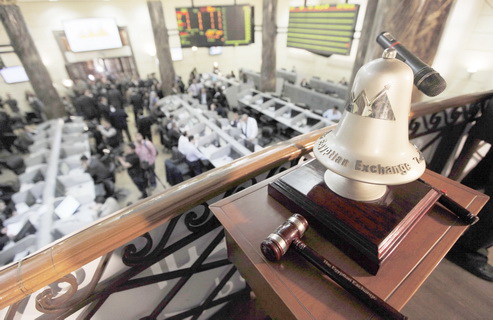Successive governments came and left. They all talked about activating the role of the stock market, and public sector propositions, and so on; yet, none of their plans ever saw the light of day. Everyone’s eyes are now fixated on the government of Sherif Ismail.
However, the chairperson of the Egyptian Exchange (EGX), Mohammad Omran, says that this time is different: “The state is adopting an economic approach which is proving to be the best in recent years.”
“This is evidenced by the economic reform programme presented to the International Monetary Fund (IMF) in the hopes of receiving the $12bn loan, with the fund observing the programme’s implementation,” he added.
Omran said that the issue of companies’ finances related to public expenditures has been talked about many times by ministers. This, he assures, signals that the government truly intends to activate its reform programme, thus leaving the practical aspect of the companies that are intended to be offered on the market ready for the move. In addition, the required finances for each company, its work plan, and choosing the investment banks that will manage those IPOs for future decisions.
The size of IPOs, the company’s attractiveness, the proportion of the IPO, its price, the economic situation, and the ability to promote products are all partially linked to the companies themselves and the state’s general circumstances. This is besides the presence of specific and clear economic policies—which could transform an attractive factor into an alienating one.
The chairperson compared Egypt’s economy to a patient with a heart disease who requires a stent [a small mesh tube that helps to keep coronary arteries open and reduce the chance of a heart attack]: “Ignorance led to needing an open heart transplant, which is the beginning of reform.” This, he explained, includes changing currency exchange policies, the gradual increase of electricity and water prices to reach their real value, and protecting lower-income citizens from the expected price hikes.
Omran said that the economic reform plan must be continued and even expanded further to include the lower levels of the government in order to ensure its success by penning encouraging policies and balancing investment, as well as ensuring freedom of market entry and exit, and countering administrative bureaucracy. He stressed that the price hikes will not continue after the restructuring programme and prices will fall back to normal.
The economic reform programme provides only the main goals, but the timetable of implementation and the reform mechanism have yet to be announced. “Procedures should be taken to serve each other and help the economy recover,” he said. “Synchronisation of decisions and the efficiency of those implementing them are all factors contributing to the success, or failure, of the plan.”
He pointed out that some countries that were in worse situations than Egypt had put together reform programmes and are now leading the developed world; whereas others were driven by a conflict of decisions and lack of coordination towards bankruptcy.
Making half or incomplete decisions deadens the economy, even if some of these were correct, according to Omran. He called upon the government to draw up a comprehensive timeline for the programme. Furthermore, he asked the state to share this programme with the Egyptian people, as, after all, they will be the ones impacted by it.
The EGX has seen a sharp fall in the volume of trade. The number of individual investors dropped significantly—now standing at less than 30,000 investors, Omran said. Moreover, foreign investors’ shares in the market transactions declined from 32% in 2009 to 15-20% in the past two years.
He explained that the EGX reflects the state of the economy: “Foreigners and individuals leaving the market was normal amid the decline in liquidity, low foreign exchange reserves, and the decline of GDP growth rates from 6% and 7% to 4%.”
But comparing Egypt in 2009 to Egypt nowadays is unfair. Omran said that the revolution changed the face of Egypt, noting that Egypt’s ranking in the Doing Business reports in the five years before 2008 was among the top 10 in the world, even leading the rankings in 2008. Now, however, Egypt stands at 132.
Omran said that the EGX should finance growth. “Abandoning its role was driven by the absence of an attractive investment climate, weak local demand, and difficulty in injecting or repatriating funds,” he added. He pointed out that Egypt offers an independent door to establish companies through IPOs without presenting financial statements, which was promoted at several conferences. “But discussions always went back to debating the investment climate itself and the status of the economy—which is out of the EGX’s hands.”
With regards to the IPO programme that the government intends to implement, Omran said that public offerings are only successful if investors believe in the improvement of economic climate and have faith in those carrying outs the reforms, as well as its ability to return higher yields, compared to other parts of the world.
Lastly, he said that Egypt needs a continuous reform model. He praised the Central Bank of Egypt’s recent successive decisions approving late payments of foreign investors’ dues, as well as its policy to depreciate the national currency in March. Collectively, this has reinforced EGX’s situation among international ratings agencies.




